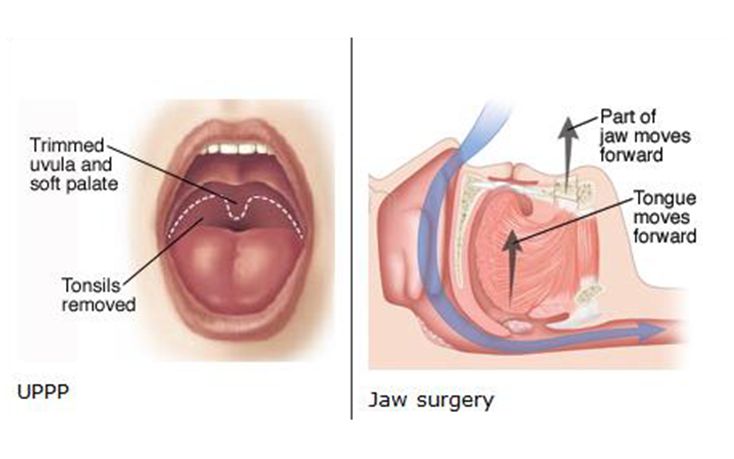Surgery to Cure Snoring
by Sleep apnea
Posted on 16-09-2021 12:26 am

Surgery Options to Cure Snoring
If you have tried medication from your doctor as well as over the counter remedies to try and help cure snoring and you have little or no success, the next step to consider is snoring surgery. Snoring should not be taken lightly as it can lead to other problems such as bed wetting, anxiety and depression.
There are several different types of surgical procedures available to either ease or stop your snoring. Your ear, nose and throat specialist will work closely with your sleep specialist to decide which surgery should work best for you. It all depends on the reason why you snore as to which procedure will be carried out.
Thermal ablation : is regularly carried out as an out patient treatment so this is ideal if you are unable to stay in hospital for whatever reason. This radio frequency current procedure is carried out while you are awake and sitting up. A probe is placed in the mouth which emits low radio frequency to selected areas at the back of the throat which manipulates the soft tissue. This treatment has a fast healing rate and is successful in around 70% of patients. Side effects are a slight sore throat, difficulty swallowing, and frequency in regurgitation of food. Your taste and smell may also be affected although this is rare.
Palatoplasty : another snoring surgery option that it stiffens and also shrinks the rear part of the mouth. Being stiffer means they are not as likely to vibrate which in essence means that you will stop snoring. The success rate of this procedure is around 60% and you have a much better chance of it working if you loose any excess weight before your operation.
Uvulopalatopharyngoplasty : is a common type of snoring surgery carried out on patients with obstructive sleep apnoea. Tissue is removed from the back of the throat which widens the airways making breathing easier. Success rates for this type of operation vary from person to person, depending on their weight and other health problems but most patients showed a significant improvement in snoring once the throat had completely healed.
Pharyngoplasty (UPPP) : A procedure carried out to cure snoring is done with the patient under local anaesthetic. This snoring surgery procedure is usually combined with a tonsillectomy where tonsils and tissue is removed and the soft palate is repositioned. The purpose of this operation is to increase the size of the airways without compromising the breathing, swallowing or speaking functions. This surgery offers advantages to other types of operations as tonsils are removed at the same time.
Somnoplasty : Another out patient treatment available to cure snoring . The patient has an oral spray applied to the roof of the mouth to cause numbness. They are then given a series of small injections into the soft palate and a somnus gun is used to administer an electric current via an insulated electrode. Snoring may seem to be worse after this treatment due to the swelling of the tissues. However, improvement is usually noticed after 2-3 weeks and for several months afterwards. Many patients found this procedure comfortable and were satisfied with the results and the positive effect it had on their lives. Specialists will only decide on a surgical procedure if everything else has failed. Your sleep patterns and breathing will be carefully monitored and recorded before any decisions are made.
Maxillomandibular advancement surgery : People with serious obstructive sleep apnoea are usually recommended for maxillomandibular advancement surgery where the bottom and top parts of the jaw are moved forward to reposition the tongue. If successful, the tongue stays relaxed during sleep and prevents snoring. Patients who undergo this procedure have normally been rigorously assessed to monitor their breathing and sleep patterns for several months beforehand to establish their suitability for this operation.
Laser assisted uvulopalaplasty : Some specialists are happy to offer patients with severe snoring problems laser assisted uvulopalaplasty where they can be treated at an out patients clinic. Local anaesthetic is used to numb the throat and a laser is used to remove the uvula and trim the soft palate. This usually takes around half an hour and snoring is reduced or eliminated altogether. Around 80% of patients only required one laser treatment to reduce or eliminate snoring.
Many people who have sleep apnoea are advised to have their adenoids and tonsils removed to ease nasal congestion. This makes breathing much clearer eradicates snoring completely in around 30% of cases. This type of snoring surgery is not dangerous and is carried out on a daily basis. A severe sore throat is the most common side effect but in rare cases, bleeding can occur from the throat.
Unfortunately, sometimes surgery is the only thing which will work for snoring. Many of these procedures take place in a clinic and you are free to go about your normal business afterwards while others may require a short hospital stay. Snoring surgery is certainly worth serious consideration, especially if you are one of the thousands of people affected by obstructive sleep apnoea. Indeed, undergoing any kind of snoring surgery could substantially improve your life and that of your partners.